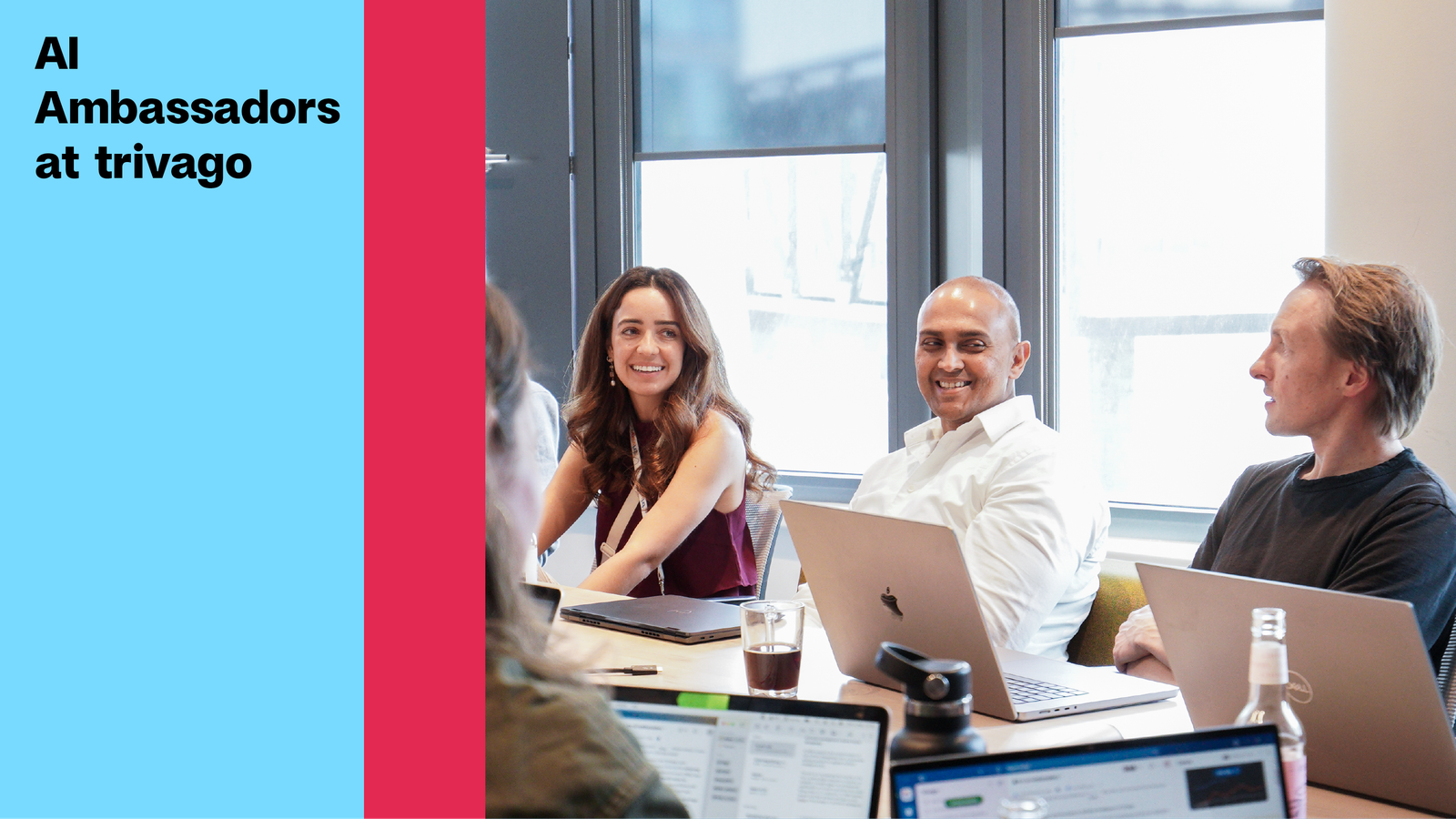Experience, Humans
Everything You Need to Know about Leadership at trivago
Contrary to the more traditional leadership setup you would expect to find in a corporate company, we have cultivated our own leadership model that is centered around empowerment and trust.
We’ve always strived to keep our hierarchy as flat as possible and our leadership model helps to support this by strengthening our horizontal workflow. We do this by having three different types of leadership roles serving different purposes: productivity, mentorship and knowledge. However, each is aimed at empowering our talents and ultimately the business to develop and succeed.
In this article we’re going to introduce you to our unique leadership model and hear from some of our leads about their experience of working in these roles so far.
Leads at trivago are advocates of our culture and product. They lead by example by empowering talents to develop, learn and evolve. They embrace and live up to our culture and take responsibility towards talents and trivago as a business.
What does the leadership model at trivago look like?
We believe that leadership is about more than just leading a team and driving strategy. We rather embrace that leadership can take many forms and that talents can develop their leadership style according to what fits their personality and skillset best. Therefore, we differentiate between the leading a team, an individual talent and an area of expertise.

What is the function of each of the leadership roles?
- Responsibility leads are focused on team leadership and are the closest to what you know as traditional ‘managers’ or team leads. They are responsible for the development of a business area and guide their teams with a clear strategy and vision to reach those business goals. They are also responsible for building up effective and efficient teams by providing the necessary context and an environment to develop and succeed.
- Mentors support talents across the company in succeeding at trivago by helping them with their personal and professional development. They especially focus on topics such as integration, motivation, and development. Mentors are approachable for their talents whenever they need a neutral self-reflection partner to identify, utilize and develop their strengths in order to achieve their full potential. This role focuses on individual support and we aim to increase networking and end-end business knowledge by connecting talents with mentors outside of their teams.
- Experts support the company by sharing their extensive knowledge and expertise in a specific topic. They lead their area of expertise by multiplying knowledge, developing others skills, guiding technical decisions and assisting in recruiting. They are a key point of contacts for their areas of expertise.
Concretely, each talent in the company has a Responsibility Lead and a Mentor to help develop and support them in their role and personally respectively. Talents do not have an Expert assigned to them to personally guide them, rather they are supporting teams and the company to help them multiply knowledge and increase skills.
What is the reasoning behind this model?
We wanted to have a leadership model that offers more non-traditional paths for development while also supporting our talents. This model also helps individuals to develop either their people leadership and knowledge leadership. Leading teams can be daunting for some talents, but with our model, talents have the chance to lead an area of expertise and help on a strategic level without leading people.
Furthermore, this model allows us to avoid typical challenges that other companies are facing, like a top-down hierarchy, which does not match our trivago DNA. The model enables us to make faster and better decisions by covering three leadership perspectives. It does this by helping our talents have more than one contact to find information and empower them to make decisions themselves.
We also believe that splitting leadership this way ensures overall company growth by strengthening and deepening our company knowledge through the experts and mentors, while the responsibility leads support our teams to build a strong culture and productivity.
Last but not least, we believe that people can grow into a leadership role. With the model we give our talents the opportunity to develop themselves professionally and personally. To support individuals in each of these different leadership roles we offer tailored learning paths to help you develop while in a leadership role.
What’s the story behind our naming convention for lead positions?
As we have quite a unique leadership model which supports a more horizontal workflow, we’ve decided to use our own internal language to describe our lead positions.
Therefore, we don’t believe in titles and don’t support title-driven leads who use hierarchy as a type of formality. We want to make sure everybody’s opinion is heard, no matter the role. Here’s an example: Titles such as “managers”, “ heads of” or a “management team” which are used in a typical corporate company aren’t used within trivago. Instead we say “lead” and therefore a classical manager is called a “responsibility lead” at trivago.
Often our talents use the title “team lead” externally to refer to their responsibility lead position. When you encounter this title, it is someone on a “manager” level.
We hope this gave you more insight into leadership at trivago! For more insight into the nuances of each role, we’d like to hand over the mic to our leads themselves who shared their testimonies with us:
Hear from trivago leads themselves
As someone who has taken on different leadership roles within trivago, what do you think you’ve gained from each of the roles you took on, how has it empowered you as an individual, and what is the common thread that you feel is at the core of all leadership roles at trivago?
I started at trivago as a junior data analyst almost 5 years ago and since then I have continued to work in the field of data, but have transitioned over to a leadership role and have been working in multiple leadership roles over the last years. I have been growing as a leader through both the responsibility lead track, where I lead a domain within hotel search and the Mentor track, helping to grow and mentor others in the way others have helped me in my time in the company.
Currently I have the amazing opportunity to work as a domain lead, part of our responsibility lead scope, where I am able to grow my strategic leadership skills and work closely to define the strategic goals of our company. As someone who started in a junior role, this has been really empowering to be able to grow from a task level view of problems to a company and pillar level view of topics to work on. As a responsibility lead, I am encouraged to take ownership of our business topics and trusted to lead people in the operational work. Leading a team and developing business strategy is something that is really motivating and trivago has made me feel empowered to directly tackle problems and develop my strengths to deal with issues that face the team and the business.
As a mentor, I have learnt even more about leading people in a way that is not directly related to business outcomes. This is quite a contrast to my daily work, as you focus a lot more on empowering others in their development and coaching, rather than direct impact. As a mentor, I aim to support my talents to develop themselves, understand feedback that they receive and spot opportunities for them to empower themselves to reach their potential. This can be challenging, but also extremely rewarding.
Ultimately, the biggest benefit for me from the mentor and mentor track is how much it has complemented my development as a leader and given me a vastly different type of challenge. Through mentoring others, I am able to reflect on my own actions as a lead – when you see the impact of different actions on your talents, you can also learn from the effect it has on your talent. Through this framework I not only help to empower my talents to develop themselves, but also see it as a way to grow as a lead in my daily work.
At the core of all the leadership roles, the biggest common trait I see is ownership and empowering others. At trivago, my biggest inspiration and motivation comes from the leads I have been lucky enough to work with, who have given me topics and responsibility without telling me how to solve or approach them. This has given me multiple opportunities to learn, grow and develop myself from the junior data analyst who started into the leadership role I am in today.
– James Neaves, Responsibility Lead and Mentor
What inspired you to become a mentor and how do you feel you’ve made an impact in this role so far?
My initial inspiration came through my own mentor back in the day. He suggested I look further into the role since I was interested in the topics of leadership and talent development. I had always found it very valuable to have a more experienced person that was there to provide some insight into the company from a different perspective than my responsibility lead.
After gaining a more holistic view of the role, I was motivated by the idea of personal development through developing others. During the process of carefully listening and facilitating a talent’s reflection on their ideas or experienced situations, one is given the opportunity to contemplate one’s own circumstances as well. This creates a certain mutuality between the talent and mentor in which both are constantly evolving based on their relationship towards each other. On top of that, I thought it was a great way to get to know people outside of my direct team, get insight into different perspectives, and an amazing opportunity to hone interpersonal skills!
I’d say the biggest noticeable impact I’ve made is when I’ve been able to “unlock” a new perspective or idea in a talent by asking the right questions. This isn’t always successful (and doesn’t have to be) but when it is it can be very rewarding for both. I love to see what ideas a talent comes up with that I would never be able to provide them myself – but they might not have thought of had we not talked about the specific topic in our 1-1. If this insight then leads to them taking action on their self-development, I feel a mentor’s job is well done!
– Arisona Hampl, Mentor
A year into my time at trivago I was seeking a new challenge, and becoming a Mentor was a great chance to build on my leadership & communication skills. I feel the impact of the role in the silences; when I ask talents an unexpected question or suggest a new angle, the silence says it all. I like to challenge how they think, allowing them a safe space to explore ideas and understand their motivations.
– Eleanor Kutylowski, Mentor
How does working in a leadership position at trivago differ from other, more traditional companies you’ve worked at? What has it taught you?
Working in a leadership position at trivago is different to more traditional companies because we are having flat hierarchies and leaders will have a lot of responsibility from the very beginning. Flat hierarchies come along with also promoting the bottom-up approach. We encourage our talents to contribute to the company goals & objectives by bringing in their own ideas and challenge their leads.
We as a company and each individual talent, benefit a lot from this approach as it broadens our mindset and keeps everybody motivated as the talents see that their opinion is important. A lot of other companies do not encourage their employees to behave like an entrepreneur, as they are restricting own decisions by implementing inflexible and hierarchical processes.
trivago offers a lead the freedom to make own decisions which provides them the opportunity to behave like an entrepreneur. This also means that you are liable for your decisions which helps you to grow by making own experiences.
– Steffen Pyka, Responsibility Lead
What are the exciting opportunities you see as an Expert to help trivago? How do you plan to create value in this role?
Becoming an Expert has been first of all an additional motivation to always keep myself up to date, in general about the best practises in my area of expertise and specifically about what is going on inside the organisation. I see my contribution there as mainly following two directions. One is to foster learning and knowledge sharing among fellow QA engineers, which has already brought positive results thanks to the activities organised in coordination with other Experts, the other is being a point of contact for testing topics across the Hotel Search pillar. In an agile environment like the one we operate in, documentation is often kept as simple as possible; in my role I can also enable others to quickly get answers or just direct them to the right persons and resources.
– Giuseppe Donati, QA Frontend/Interface Expert
I have always been partial to diving deep into topics, and the expert role has allowed me to take advantage of this predisposition. In the role, I help build a solid technical foundation for the team and guide the evolution of our processes and algorithms. It also puts me in position to foster connections with other teams, providing an avenue for everybody to learn from one another.I find it particularly exciting when we get new talents. The job is as much about onboarding the new talents as taking what new expertise these talents bring to the table and integrating them productively within the trivago context.
– Gerard Leyson, Recommender Systems Expert
Working with this pool of talented and knowledgeable people with the common goal of generally empowering everyone around us. I really enjoy knowledge sharing, so having a bunch of like-minded where we all get to learn from each other while taking that back to our perspective areas to further enrich the knowledge bases there is an awesome opportunity.
– Perry Manuk, Cloud Technologies Expert
Curious to see which leadership roles we’re currently hiring for?



